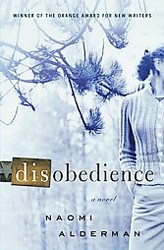“It is important to quiet the lamb, that is the first thing.” So begins Naomi Alderman’s The Liars’ Gospel, a fictional account of Jesus’ life set against the backdrop of the Jews’ struggles against Roman rule.
Alderman gives us four points of view, or gospels, on the life of Yehoshuah (Jesus), focusing mainly on the time between his departure from home and his death. We hear from his mother, Miryam (Mary), who laments her son’s departure and has trouble accepting him in his new role as a “teacher.”
We hear from his follower, confidant, and later his betrayer, Iehuda (Judas), one of the most compelling characters in this story. It is through Iehuda’s eyes that we see Yehoshuah evolve from a man who has gathered a few supporters through his messages of forgiveness and healing, to a man who is leading a movement of thousands of followers. Through Iehuda we see how Yehoshuah loses his way gradually, in small missteps, veering incrementally farther away from the messages he started his teachings with and into a more self-serving role.
We hear from the high priest, Caiaphas, whose life’s work was to maintain the precarious balance between the desires of the Jews and the demands of the Romans.
And finally we hear from a young Jewish rebel, Bar-Avo (Barabbas), in whose hands lies the fate of the Jewish people at the time.
In this fictional account of Jesus’ life the sacrificial lamb is an apt metaphor for Jesus’ followers, for the Jewish people, and for the high priests who shepherd them through Roman rule.
With exquisite prose, Alderman gives us a human treatment of a man from humble beginnings who, somehow, has been deified. Through her gospel we can begin to answer the question of how, exactly, that might have happened.
An Interview with Naomi Alderman
Naomi Alderman was a finalist for the 2007 Sami Rohr Prize for Jewish Literature and is a Sami Rohr Prize Literary Institute fellow. Her most recent book, The Liars’ Gospel, was published by Little, Brown and Company.
Ada Brunstein: What made you want to write this book?
Naomi Alderman: I first thought of the idea for this book about twenty years ago when I was sixteen or so. I was studying both Hebrew and Latin at the same time which gives you two quite interesting perspectives on the same period. And my Hebrew teacher was telling me that there were references to Jesus in some of the ancient Jewish texts of the period. And I said ‘Oh somebody should write a book about this,’ and she said, ‘no no no they shouldn’t; no one should write a book about the Jewish Jesus.’ And of course that kind of strong reaction will make it stick in your mind.
And then it was this idea that would recur to me every Easter when there would be all sorts of things on the BBC about Jesus and Easter and it would just be so simplistic as an understanding of what was going on at the time: there are nasty high priests who did nasty things and Jesus died. It’s so much more complicated than that.
AB: How did you choose the characters you chose for these four gospels from among all the characters in Jesus’s life?
NA: They are the ones who spoke to me.
I would have loved to have gotten something out of Mary Magdalene but I couldn’t make her say anything to me.
I suppose the high priest definitely chose himself because that character seemed so neglected and I think he’s my favorite of the four because it just feels like a perspective that I haven’t ever seen.
Barabbas was definitely the last one for me to choose and for a long time I wasn’t sure he was right, but as I thought about it he got more and more right.
Judas also I think basically chose himself. I was very interested in whether I could portray him as somebody who was incredibly sincere in his various beliefs rather than again a pantomime villain character, a blaggard.
AB: Your portrayal of Judas is indeed more nuanced than the way we usually see Judas portrayed. Can you say more about how that character evolved?
NA: In fact the character note for Judas I got directly from the Gospel of Mark, which is the earliest Gospel. This is what you get in the story of how that happened: You have two things juxtaposed right next to each other. There’s the story of how they go to Bethany, or Beith Anya, and this woman comes and pours perfume on Jesus’s head. In Mark it says one of the disciples said ‘why did you let her do that? The perfume could’ve been sold and money could’ve been given to the poor.’ And Jesus gives a really terrible answer. He says ‘why wouldn’t I let her do it? I will not be with you for too much longer, but the poor will always be with you.’ It’s a terrible answer. And then the very next line is ‘and then Judas went to betray him.’ And reading that as a novelist I thought well, ‘one of the disciples,’ that seems like it was obviously Judas and that was obviously his reason. And once you have that as the reason —because that’s quite a challenging question to which Jesus gives an evidently awful answer — that’s the basic note of that character.
Incidentally John, which was written much much later evidently came to the same conclusion as me. So he goes, ‘Judas said why did you let her do it, the perfume could’ve been sold and the money given to the poor.’ And then John adds another bit saying that Judas only asked this because he wanted to steal the money and keep it for himself.’ And you go ‘John, boytchik, you know you’re making that up. You saw what I saw in there which is that if you’re following a man who gives that answer then you can have a reason to feel like you have already been betrayed.’ This is the character note for Judas. He’s a man who betrays but he also feels he’s been betrayed.
AB: What was your own religious background growing up?
NA: I grew up really Orthodox. My parents are both still really Orthodox. Not Haredi but very observant, keeping kosher and keeping Shabbos and keeping not only Passover and Yom Kippur but also Tu b’Shvat, Sukkot, Tzom Gedaliah. And I was probably religious until I was 26 or 27. And I was still fairly observant until my first novel was published. It was really the publication of that novel that let me somehow leave it on the shelf.
AB: In many ways this is a book about the power of the story more than the power of the story teller.
NA: Thank you for understanding that. I would hate to tell anyone else how to read my novel and I hope that I write in such a way that I don’t force an interpretation on the reader, but to me Caiaphas is the hero of that story, as well as the high priests who follow him. These people who sacrificed basically everything in order to keep the peace. And Barabbas is the villain. Now, I think I leave it open enough that you could read it the other way around. But I didn’t not expect at the end of the book to have come to that opinion.
And not everything that Jesus said is good. For example that answer that he gives about the perfume is a terrible answer. But one of the things that he says, for example love your enemy, that’s a great saying. It’s a great thought and by the end of the book having thought a lot about the history of the time, it would’ve been better if they [the Jews] hadn’t been in constant rebellion. The constant rebellion did them no favors whatsoever.
In a way I’m with Josephus. He was a Jewish nobleman. For a while he had been part of the resistance against Rome and eventually he changed sides and helped the Romans. He was a traitor. But the situation of a traitor is interesting and sometimes people become traitors because the alternative is worse. So Josephus has his views and he wants to argue in his book that it would’ve been much better for the Jews to not resist, and after having looked into the period I ended up agreeing with him. But the fundamentalists in Jerusalem both then and today would completely disagree with that.
AB: In the book there are ways in which Jesus seems insane. When you were writing this book were you thinking of any similar modern day extreme religious leaders, for example cult leaders?
NA: I started from the premise that he wasn’t the son of God. So with that in mind then one has to explain some of the things that he said. Now some of the things that he said are very very good and if we can believe the account in the gospels, he’s clearly a thoughtful person who wants to dig into the meaning of rituals and laws. And let’s not forget I grew up really religious and there are some really inspirational rabbis out there who dig into that stuff, who talk about it very humanely. If you don’t believe in God and the Torah then they do sound a bit insane, but at the same time I would not like to say that Jesus is mad. At certain points he definitely seems mad but I think there’s an element of madness which is just believing things that people around you don’t believe and in that sense I think most of us have some private madness.
I definitely did try to think about the kinds of people throughout history who are like this, both people who have had wonderful influences and people who have had terrible influences.
I definitely think there’s a pattern with Jesus that exists with a lot of other religious leaders. Some of them turn into what we call cults because they don’t get a lot of followers and some of them turn into what we call religions because they do get a lot of followers. And some of that is pure accident about which one happens to strike at exactly the right moment.
So if you look at the founding of Mormonism, of Scientology, you can see the same sort of things. There’s the charismatic guy at the center, but interestingly the thing doesn’t usually start to take off until the charismatic leader has died and then there’s somebody else who comes on and takes on that legacy.
AB: We’ve talked about the powerful men in this book. Now tell me something about the women.
NA: Caiaphas’s wife, who doesn’t have a name. I love her. I discovered her in the text in the way that you discover the existence of a planet, by seeing how the other planets’ orbits are affected by it. So Caiaphas is real. His father-in-law Annas is real. Annas had four sons and a son-in-law who all became high priests. So this is a very powerful man. The son-in-law is very suggestive because clearly there’s an implied wife there whose father was the high priest, whose husband was the high priest and whose four brothers were all high priests. It’s impossible to imagine that she’s an airhead. This is a woman right in the center of power and no one has even bothered to record her name. So that is part of the reason I didn’t give her a name, as a little protest to the ill-treatment given to this woman.
It seemed to me if you have four sons and a son-in-law who become high priests then the son-in-law is in a slightly tricky position because he has to stay in the good graces of his father-in-law, who is an extremely powerful man and it seemed to me that the relationship with the wife would be critical. How that relationship with the wife was maintained would be of vital importance. So I wanted to focus his story on that, so I made her cool. And I thought with four sons and a son-in-law as high priests, is it possible that Annas would not have educated his daughter? Is that conceivable? I found it completely inconceivable.
And also the second wife, I love her as well. She’s also called Hodia’s daughter throughout, except he does ask her her name and her name is the number daughter that she is which is Bat Sheva, the woman whom David falls in love with (well, takes a fancy to when he sees her bathing on the roof, let’s be real about it). That’s also a terrible name, Bat Sheva, seventh daughter.
It seemed to me that to portray the life of Caiaphas accurately one would have to talk about the fact that his position is really dependent on whom he’s having sex with.
AB: Judas is an observer amid this “insanity” and he slowly watches it unfold and gradually goes from being a believer to not so much and these moments of realization are painful. You feel for him.
NA: Good! I’ve given up being an Orthodox Jew so I have some sympathy for people who have lost their faith. And I felt like I had to respect both parts of his story. There’s a Christian tradition that he was the most beloved one of Jesus, they were the closest, and you have to respect that. And then you go ‘so what does it take for a person to go from being the favored one and the closest one and the best one to being the one that betrays him?’ Well, that takes a break; an intense emotional experience of loss. I wanted to convey that.
Ada Brunstein is a freelance writer and an acquisitions editor for Cambridge University Press. She has an MA in Linguistics from NYU and an MS in Science Writing from MIT. Her writing has appeared in The New York Times, New Scientist, Discover, and The Vocabula Review.
Ada Brunstein is the Head of Reference at a university press.




